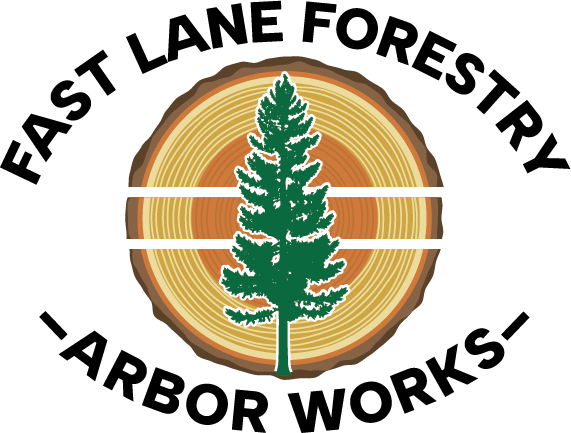From Log to Lumber: The Mobile Milling Process and How It Benefits Landowners in Eugene
Do you have valuable timber on your property – perhaps from a tree removal Eugene project, a storm-damaged tree, or a proactive forest thinning? Many landowners in Eugene and Lane County might see these logs as just firewood or waste. However, with mobile milling, those logs can be transformed right on your property into custom lumber, unlocking significant value and utility.
At Fast Lane Forestry & Arbor Works, we bring the mill to you. Let's explore what mobile milling is, how it works, and why it's a game-changer for landowners.
What is Mobile Milling and How Does It Work?
Mobile milling involves using a portable sawmilling unit that can be transported directly to your property. Instead of hauling heavy logs to a fixed mill, the milling takes place where the logs are.
The Process:
- Log Preparation: Logs are cut to appropriate lengths, typically 8 to 16 feet, and positioned for easy access by the mill.
- Milling On-Site: Our specialized mobile sawmill arrives at your property. Logs are loaded onto the mill bed.
- Custom Cuts: Our experienced operator then uses the saw to slice the logs into planks, beams, slabs, or other dimensions specified by you. This can include precise cuts for specific projects like decking, flooring, or furniture.
- Stacking and Drying: Once cut, the green (freshly sawn) lumber is typically stacked with "stickers" (small strips of wood) between each board to allow for air circulation, which is crucial for proper drying.
Advantages Over Hauling Logs to a Traditional Mill
Mobile milling offers several compelling benefits that traditional, fixed-location sawmills cannot:
- Cost Savings: You save significantly on transportation costs. Hauling large, heavy logs to a mill can be expensive and logistically challenging, especially if you have an extensive tree removal Eugene project.
- Reduced Labor: Less handling of logs for you. The milling happens where the logs lie.
- Customization: You get precisely the dimensions and cuts you need for your specific project. This is invaluable for unique builds or custom furniture.
- Value Retention: You retain 100% of your timber, rather than selling logs to a mill at wholesale prices and then buying finished lumber. This can turn a "waste" product into a valuable resource.
- Environmental Benefit: Reduced transportation means a smaller carbon footprint.
- Local Resources: You get to utilize the unique character of trees from
your own land, fostering a deeper connection to your property.
Limitations: What to Consider
While highly beneficial, mobile milling does have some limitations:
- Log Size: Most mobile mills have limitations on log diameter and length they can handle. We will assess your logs to ensure they are suitable.
- Log Condition: Logs need to be relatively clean, free of excessive dirt, rocks, or metal (like old fence wire) which can damage saw blades. We can help with log preparation guidance.
- Access: The mobile mill requires clear, relatively level access to the logs.
- Species: While most common local species (Douglas Fir, Cedar, Oak, Maple) mill beautifully, some very dense or very softwoods can be challenging.
Examples of What Clients Have Done with Their Custom Lumber
The possibilities are truly endless when you have custom-milled lumber from your own property:
- Decking & Fencing: Durable, natural lumber for outdoor structures.
- Furniture: Unique tables, benches, and other pieces with a story.
- Outbuildings: Barns, sheds, and workshops built with your own timber.
- Interior Paneling & Flooring: Adding rustic charm and character to your home.
- Artisan Projects:
Slabs for live-edge tables or custom woodworking.
Imagine building a deck or a piece of furniture from a tree that once stood proudly on your land – that's the kind of personal value mobile milling provides!
How to Prepare Logs for Mobile Milling
If you're considering mobile milling, a little preparation goes a long way:
- Clear Access: Ensure clear, relatively flat access for our mobile mill to reach the logs.
- Clean Logs: Remove as much dirt, mud, and debris as possible. Check for embedded metal.
- Cut to Length: Ideally, logs should be cut to the desired length (e.g., 8', 10', 12', 16') before milling, plus about 6 inches for trim.
- Stacking:
Stack logs on elevated skids to prevent them from resting directly on the ground, which can cause rot and attract insects.
Unlock the hidden value in your timber. Whether it's from a necessary tree removal Eugene, tree trimming Eugene of larger branches, or sustainable forest management, Fast Lane Forestry & Arbor Works can help you transform your logs into valuable lumber. We are also experts in hazardous tree service Eugene and all aspects of tree service Eugene, ensuring your property is managed safely and effectively.
Contact Fast Lane Forestry & Arbor Works today at https://www.fastlaneforestry.com/ to discuss your mobile milling project and discover the potential of your land.
